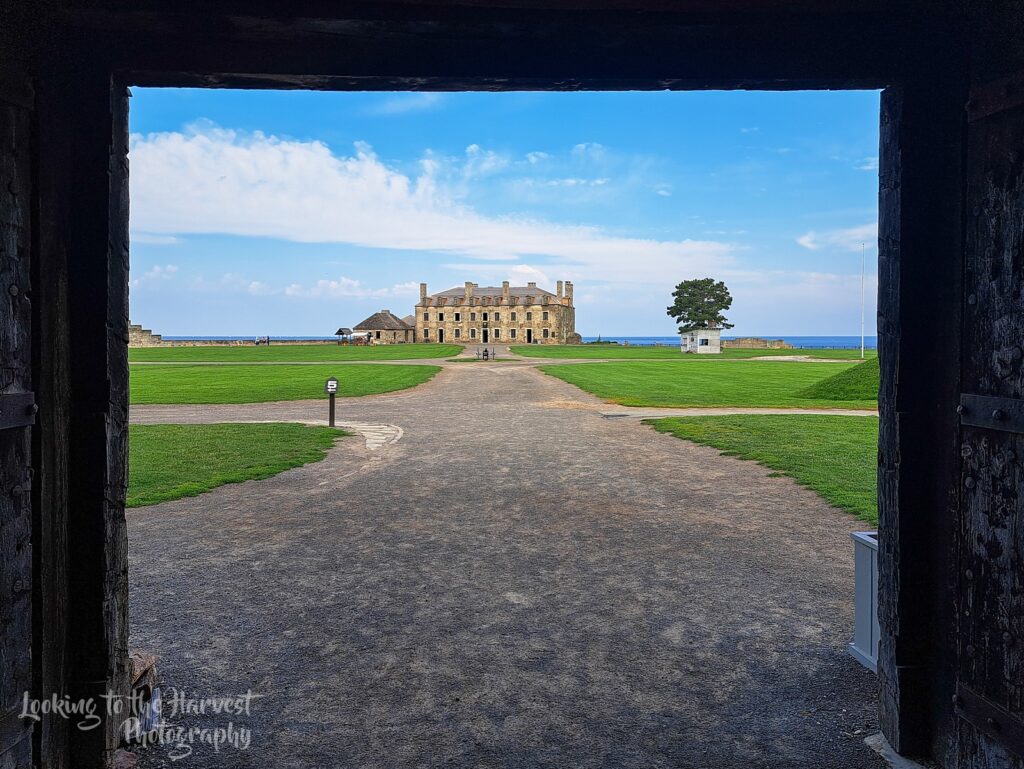The Linchpin for Victory
My family and I tottered across the uneven rock path. Stone walls hemmed us in on both sides, as we passed through the tunnel towards the sun peeking out at the other end. As the darkness gave way, our field of view grew wider to reveal the vista before us. An open field of green grass lay ahead, enveloped by a circle of stone walls and structures. Directly in front, guarding the lapping water of Lake Ontario spread a massive 18th century building dubbed, “The French Castle.”
As we trekked across the grass, I swung my head around to take in the scene around me. Bastions jutted out towards the sea with cannons protruding from their openings. Buildings filled the perimeter—made to stockpile ammunition, supplies, and even soldiers. In the middle of the courtyard, three different flagpoles stretched to the sky and told the embattled history of Old Fort Niagara.
Hundreds of years ago, the waterways surrounding Fort Niagara held the key to power in North America. Whoever controlled access to the fort controlled access to transportation throughout the Great Lakes and into the heartland of present-day America. Its strategic placement at the mouth of the Niagara River caused the fort to change hands multiple times—finding ownership by France, Britain, and finally the United States. Englishman, Arthur Young acknowledged that “the importance of this place is inconceivable; it is the key to the whole continent.”
For years this site battled for its life, as soldiers loaded shot after shot into their cannons in order to grip tight to their control of the waterways. Yet a few years after the fort battled through The War of 1812, a different kind of blow shook Fort Niagara. In 1825, just south of its blue shores, completion of the Erie Canal created a new pass-through for merchants, traders, and military. In a moment, the fort that had once meant the difference between power and defeat for a commanding country became negligible—insignificant even.
The remainder of the fort’s days were spent in relative silence and peace. What once was the linchpin for victory became an extra military base for training. The last army units were removed sixty-years ago, and now moms and dads with cameras chase after their children along the bastions that whisper its history.
Isn’t it interesting how quickly change occurs? What seems so vital one minute, the next is tossed to the side. The site that dozens of men bled and died to protect would become obsolete in a manner of decades. While we are far removed from cannons and naval battles, our world of insta-everything echoes with the same warnings. We are surrounded by instant success and instant failure. The influencer who racked up followers, can just as easily have them turn to enemies with one new revelation. The causes we fight for today, may not always be the ones we regard as worthy tomorrow.
Ironically during my family’s trip to New York and Old Fort Niagara, I spent my free time reading the words of Christians during a similar time period. With my kindle in hand, I tabbed through sermons by Puritan preachers and writers from the 17th century. These men preached to their flock about life and death, and urged them to turn their eyes on the most important truths of that time. Yet each of those encouragements and admonitions rang true for me today. None had been replaced. Their words hung relevant for the men and women who lived during the time of Old Fort Niagara, and they ring true for the 21st century I walk in today.
The linchpin of our hope for the Christian has never changed. It’s not been replaced by a different revelation or creation, and it never will. We need Jesus—the gift of his sacrifice, the blessedness of his union, and the sweetness of his Word. He’s the key to our hope, and no amount of years or advancements will change this fact.
This is one of the benefits we enjoy when we turn our attention to the writings of men and women who have gone so far before us. Whether its John Owen in the 1600s or all the way back to the 3rd century with Athanasius, we find what has been important then is still just as important now. The saints before us lived each day in light of the same hope of Christ. They loved, forgave, faced depression, and grieved with the same words from God on their lips. And they even walked to their death for the same gospel hope.
In a world where leaders, powers, militaries, and even the latest internet sensation are blown away like grass, may we remember our sovereign King will never be upended. All of the time, prayers, and trust we place at his feet will never be made null. Dear saint, the importance of our Christ is inconceivable; he is the key to our life and the lives of every saint who has gone before us. Together, we strive towards Him who lasts.

